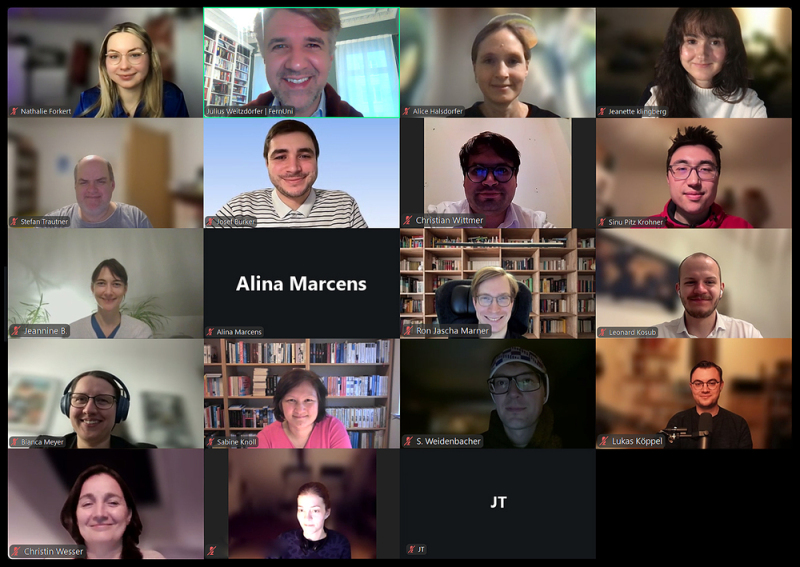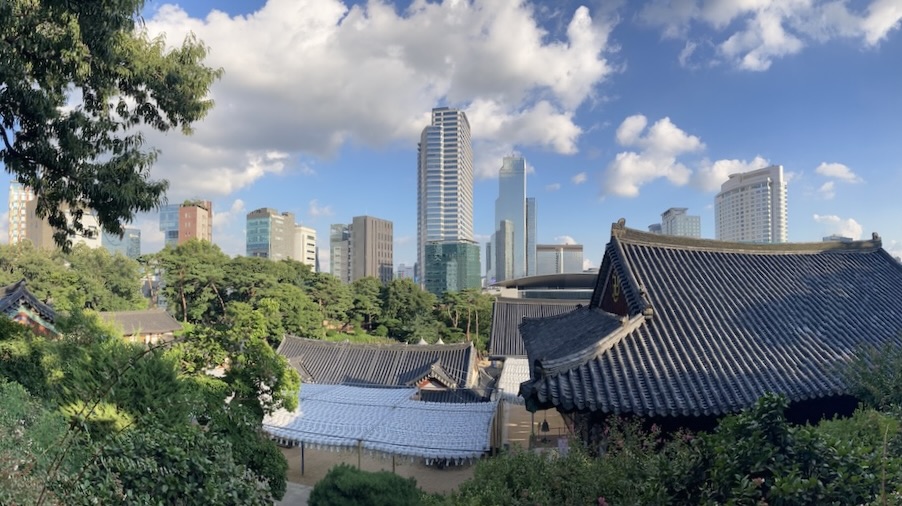Korean Law – Flexible Graduate Programme (new 2025)
The Republic of Korea is a nation of rapidly growing international economic, technological and political importance. Moreover, there has been a sharp rise in students’ interest in Korea in recent years, in part fuelled by Korean popular culture. Right after the relaunch of the fully updated graduate programme on Japanese law in January 2024, the Junior professorship of East Asian Law has developed the new graduate programme "Foundations of Korean law" as its first offering on another East Asian legal system. This new graduate programme will start in the summer semester of 2025, being the first university degree in Korean law outside of East Asia.
 Foto: Leonard Kosub
Foto: Leonard KosubThe eleven new course books were developed by seasoned experts from renowned universities, who were commissioned by Prof Dr Weitzdörfer during a trip to Korea in 2023. The content of the graduate programme was designed similarly to the existing programme on Japanese law. This way, we hope to be able to offer all graduates of our three graduate programmes full credit transfer opportunities as part of a planned LLM in East Asian Law.
Initiated by Jun-Prof Dr Weitzdörfer’s predecessor, Prof Dr Hans-Peter Marutschke, more than ten years ago, there have been continuous efforts and preparations to expand the range of programmes from the established programme on Japanese law offered by Hagen University to include the legal systems of other East Asian countries. Johann In-Ho Kim, who headed the Department of Japanese Law from 2013 to 2016, continued the project.
The new graduate programme is characterised by the following advantages:
- Completely new study materials with the latest Korean case law and legislation
- Diploma of Advanced Studies degree recognised by the Federal Ministry of Education in accordance with the German Qualifications Framework (DQR 7)
- Full access to numerous legal databases
- Remote loan of approx. 6,000 volumes and 2 Korean subscription journals from our extensive Korean law library
- Access to our network of experts and around 400 alumni worldwide
- Full flexibility in terms of location and time, start of programme at any time, even without knowledge of the Korean language
- Individual specialisation thanks to elective modules and selectable topic of the coursework
-
Module 0: Methodological Approach (10 ECTS)
Course unit CL – Introduction to Comparative Law
Module 1: Public Law (10 ECTS)
Course unit K1 – Korea: Society, Politics and Economy – Prof Dr Eun-Jeung Lee (Freie Universität Berlin)
Course unit K2 – Historical Background of the Private Law System – Prof Dr Sang-Yong Kim (Emeritus at Yonsei University)
Course unit K3 – Judicial System in the Past and Present – Prof Dr Woo-Jin Choi (Korea University)
Course unit K4 – Constitutional Law I: State Organisation Law – Prof Dr Kwang-Seok Cheon (Emeritus at Yonsei University)
Course unit K5 – Constitutional Law II: Fundamental Rights – Prof Dr Kwang-Seok Cheon (Emeritus at Yonsei University)
Course unit K6 – Criminal Law – Prof Dr Jong-Hwan Kim (Yonsei University)
Module 2: Private Law (10 ECTS)
Course unit K7 – Private Law I: Overview – Prof Dr Dschungmo-Ivo Seong (University of Seoul)
Course unit K8 – Private Law II: General Part of the Korean Civil Code – Prof Dr Kyung-Hyo Ha (Emeritus at Korea University)
Course unit K9 – Private Law III: General Part of Contract Law – Prof Dr Byung-Jun Lee (Korea University) / Prof Dr Kim Hwa (Ewha Womans University)
Course unit K10 – Private Law IV: Special Part of Contract Law – Prof Dr Byung-Jun Lee (Korea University)
Course unit K11 – Private Law V: Property Law – Prof Dr Jin-Ki Lee (Sung Kyun Kwan University)
Seminar (10 ECTS)
Written paper and oral presentation
-
In addition to the compulsory modules, the following elective modules are being developed and will be offered as optional units in the future:
Elective Module 1: Specialisation in Private Law (10 ECTS)
Course unit K12 – Family Law – N.N.
Course unit K13 – Management without Mandate and Unjust Enrichment – Prof Dr Kyu-Wan Kim (Korea University) / Dr Daegu Sung (Judicial Policy Research Institute at the Supreme Court of Korea)
Course unit K14 – Tort Law – Prof Dr Sang-Joong Kim
Elective Module 2: Labor Law (10 ECTS)
Course unit K17 – Labor Law I: General Foundations – Dr Anna Hyler / N.N.
Course unit K18 – Labor Law II: Collective Labor Law – Dr Anna Hyler / N.N.
Course unit K19 – Labor Law III: Individual Labor Law I – Dr Anna Hyler / N.N.
Course unit K20 – Labor Law IV: Individual Labor Law II – Dr Anna Hyler / N.N.
Course unit K21 – Labor Law V: Individual Labor Law III – Dr Anna Hyler / N.N.
-
The modules mentioned above are thematically and chronologically self-contained. This organisational principle allows you to structure your studies in a clear and flexible manner and thus adapt the duration of your studies, your study times, and, above all, the distribution of your workload to suit your individual needs. All modules of this graduate programme are offered continuously and are tailored to ensure that they can be successfully completed within one semester. However, you are not restricted to semester times and can start and complete a module at any time.
-
This programme is aimed at anyone who has a particular interest in Korean law, either professionally or personally. Prior knowledge of law or knowledge of the Korean language is not required.
The winter semester of 2025/26 saw the first cohort of 19 students start their studies in the graduate programme:
 Foto: FernUniversität in Hagen
Foto: FernUniversität in Hagen -
The graduate programme "Foundations of Korean Law" is open to anyone who
- has successfully completed a university degree (at a university or university of applied sciences) or
- has acquired the necessary aptitude through professional training (completed vocational training and employment in a relevant profession – e.g., judicial clerk, foreign language secretary, foreign trade clerk, interpreter, specialist for labour market services, notary clerk, patent attorney assistant, legal assistant, social security clerk, assistant tax consultant, administrative clerk).
The required professional aptitude is verified at the time of enrolment by the registrar’s office; in cases of doubt, the academic directorate will determine if the applicant’s professional qualifications are sufficient for admission. Information on this can be obtained by email at eastasianlaw. The examination regulations mentioned below apply.
-
The fee for the graduate programme is EUR 2,000 (payment in instalments possible). This includes access to the three basic modules, including taking the final module examinations as well as support and participation in the final seminar for up to five semesters. If you need more time for your studies after the end of five semesters, an additional fee of EUR 150 will be charged for each additional semester.
As soon as the optional elective modules are available, a fee of EUR 500.00 will be charged for each chosen module. You can re-register for an additional semester free of charge for each elective module you have taken. If you have already taken this graduate programme in the past, you can resume your studies at this price by taking one or more elective modules at no additional cost and receive a new certificate.
According to the new examination regulations, as of 2025 there will be extensive credit transfer options, including 10 ECTS credits for the degree ‘Foundations of Korean Law’ for the acquisition of our graduate programmes in Japanese and, in future, Taiwanese law.
According to the new examination regulations, as of 2025 the fee for the graduate programmes on Japanese and Taiwanese law can be reduced by a fourth per module upon recognition (currently EUR 375 for Taiwan, as from 01.01.2027 EUR 500; EUR 500 for Japan). The transfer of credits of module 0 from other graduate programmes is generally always possible, the transfer of credits of a final seminar from other graduate programmes is not possible.
If you have any questions you can contact us at eastasianlaw. The registration form can be found below.
Downloads (in German)
- Faltblatt Flyer (PDF 269 KB)
- Zulassungsantrag (PDF 187 KB)
- Prüfungsordnung (ab 01.10.2025) (PDF 270 KB)
Learning Platform (in German)
Study Material Sample (in German)
Auszug aus "Kurseinheit K4: Koreanisches Verfassungsrecht I: Staatsorganisationsrecht" (PDF 580 KB)
 Photo: Sebastian Weidenbacher
Photo: Sebastian Weidenbacher
I completed the graduate programme on Japanese law while preparing for the First Judicial Examination and enrolled in the programme on Korean law right after. The comparative law focus of the programme helped me to better understand the connections within German law and thus achieve a double-digit score in my oral examination.
Sebastian Weidenbacher, translator and law student
 Photo: Ron Jascha Marner
Photo: Ron Jascha Marner
I get to contextualize my experiences in Korea, develop them further professionally and refine them for the Korean job market.
Ron Jascha Marner


